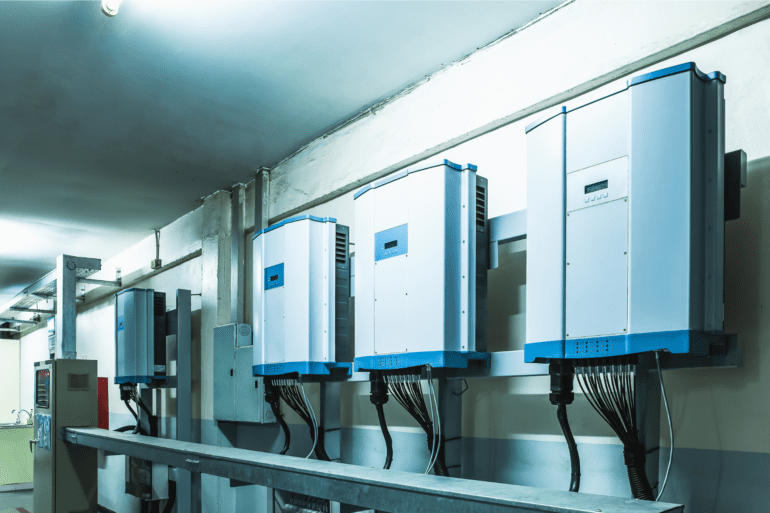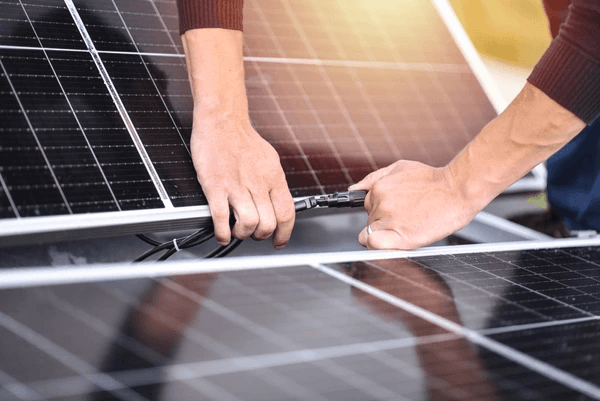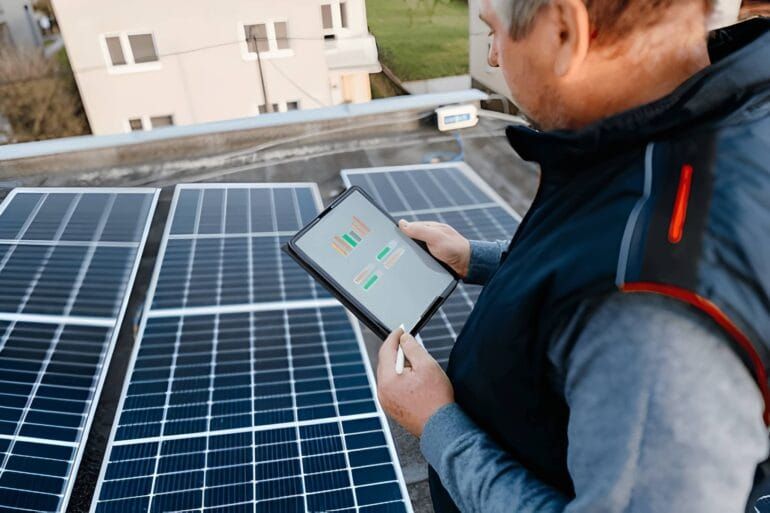Embark on a journey into the world of renewable energy as we delve into the intriguing question: Can car batteries be used with solar panels? Discover the intricate workings of this dynamic duo, unravel the advantages of their integration, and navigate through the challenges associated with harnessing clean, solar power. Join us in exploring the sustainable possibilities that lie at the intersection of solar panels and car batteries, paving the way for a greener and more energy-efficient future.
Understanding Solar Panels and Car Batteries
Before delving into the integration of car batteries with solar panels, it’s essential to understand the basic functionalities of each component.
Solar Panels
Solar panels are devices designed to convert sunlight into electricity. They consist of photovoltaic cells that absorb photons from the sun, initiating an electron flow and generating direct current (DC) electricity. This conversion is the cornerstone of solar power generation, offering a sustainable and eco-friendly alternative to traditional energy sources.
Car Batteries
Car batteries, on the other hand, are rechargeable energy storage units that provide electrical energy to start an internal combustion engine and power vehicle accessories. They are typically lead-acid batteries, known for their ability to deliver a high burst of power required for ignition.
Can car batteries be used with solar panels?
The integration of car batteries with solar panels involves a complex interplay of components and requires careful consideration of electrical specifications. Here’s a step-by-step breakdown of the process:
Solar Panel Generation
Solar panels generate DC electricity when exposed to sunlight. The amount of power produced depends on factors such as sunlight intensity, duration, and panel efficiency.
Charge Controller
To regulate the voltage and current from the solar panels, a charge controller is essential. This device prevents overcharging, which can damage the battery, and ensures optimal charging conditions.
Inverter
Car batteries operate on direct current, while most household appliances use alternating current (AC). An inverter is employed to convert the DC electricity from the solar panels and batteries into AC electricity, making it compatible with common household devices.
Battery Storage

Solar energy is intermittent and dependent on sunlight availability. Car batteries act as storage units, storing excess energy generated during peak sunlight hours. This stored energy can be utilized during periods of low sunlight or at night.
Power Distribution
The inverter is connected to the household electrical system, enabling the distribution of solar-generated power to various appliances. Car batteries play a crucial role in ensuring a continuous power supply, especially during periods of low or no sunlight.
Types of Car Batteries and Their Suitability for Solar Panels
Deep-Cycle vs. Standard Car Batteries: When it comes to using car batteries with solar panels, it’s important to understand that not all batteries are created equal. In particular, there’s a big difference between deep-cycle batteries and standard car batteries, especially in how well they work with solar power systems.
- Standard Car Batteries: These are the typical batteries found in most cars, known as lead-acid batteries. Their main job is to deliver a quick and powerful burst of energy to start your car. However, they aren’t designed to handle the frequent charging and discharging that comes with solar energy storage. In fact, if you use them in a solar setup, they’re likely to wear out quickly because they’re not built for long-term energy storage. As a result, their lifespan and performance can drop off much faster than you’d like.
- Deep-Cycle Batteries: In contrast, deep-cycle batteries are made to be discharged deeply and then recharged many times over. They’re the go-to option for applications that need a steady and reliable flow of power over longer periods, like RVs or off-grid solar systems. When paired with solar panels, these batteries are much more efficient at storing solar energy generated during the day and providing power when the sun isn’t shining. This makes them ideal for ensuring that you have a consistent energy supply, even at night or on cloudy days. Plus, deep-cycle batteries generally last longer than standard car batteries, so they’re a better investment for solar energy storage in the long run.
Alternatives to Car Batteries for Solar Panels
Deep-Cycle Batteries as a Better Option: While it’s technically possible to use standard car batteries with solar panels, deep-cycle batteries offer a much better solution. They’re designed to handle the kind of demand that comes with storing solar energy, making them more efficient and cost-effective in the long term.
- Longevity: One of the biggest advantages of deep-cycle batteries is their durability. They’re built to endure the frequent charging and discharging cycles that are typical in solar energy systems. Unlike standard car batteries, which can degrade quickly under such conditions, deep-cycle batteries hold up well over time, maintaining their capacity and performance.
- Energy Efficiency: Deep-cycle batteries are more efficient when it comes to storing and releasing energy. This means you get more usable energy from your solar panels, reducing waste and making your system more effective overall.
- Cost-Effectiveness: Although deep-cycle batteries might be more expensive upfront, they’re a better investment in the long run. They last longer and are more efficient, so you won’t need to replace them as often. This makes them a smarter choice financially when you’re looking to maximize the benefits of your solar energy system.
Electric Car Batteries and Solar Energy
Electric Car Batteries as Backup for Solar Systems: Electric car batteries are becoming an increasingly popular option for storing solar energy, offering a powerful alternative to traditional solar batteries. As electric vehicles (EVs) become more widespread, these batteries are proving to be valuable not just for driving but also for storing and supplying energy.
- Large Storage Capacity: Electric car batteries typically have a much larger capacity than standard car batteries, which makes them ideal for storing excess solar energy. During peak sunlight hours, these batteries can store a significant amount of energy, allowing you to tap into it when the sun isn’t shining as brightly. This reduces your reliance on the grid and gives you more control over your energy use.
- Bidirectional Charging: One of the standout features of electric car batteries is their ability to charge and discharge power. This means they can store solar energy and then supply it back to your home or the grid when needed. For example, if your solar panels aren’t producing enough energy during the night, your electric car battery can step in and power your home. This flexibility makes electric car batteries a great addition to any solar energy system.
- Flexibility: Electric car batteries can be used in various ways to enhance your solar energy setup. Whether you’re looking for backup power during outages or want to maximize the use of your solar energy, these batteries offer a versatile solution that can adapt to your needs. You can even combine them with traditional solar batteries to create a more robust and reliable system.
Charging Car Batteries with Solar Panels
Specific Charging Techniques: Charging a car battery with solar panels isn’t as simple as plugging them together. There are specific techniques and tools you need to use to ensure everything runs smoothly and safely.
- Charge Controllers: A charge controller is a key piece of equipment that helps regulate energy flow from your solar panels to your battery. It prevents the battery from overcharging, which can cause damage, and helps optimize the charging process. This ensures that your battery is charged efficiently without wasting any energy.
- Sizing the Solar Panel Setup: It’s important to match the size of your solar panel setup to the capacity of your car battery. If your panels produce more power than the battery can handle, it could lead to overcharging and reduce the battery’s lifespan. Conversely, if the panels are too small, they might not provide enough power to fully charge the battery, making the system less efficient.
- Voltage and Current Management: Managing the voltage and current levels during charging is essential for protecting your battery and ensuring efficient energy transfer. You can achieve this by using the right wiring, connectors, and charge controllers that are compatible with both your solar panels and battery.
Technology Integration with Solar Panels
Advanced Technologies in Solar Systems: Solar energy systems have come a long way, and modern setups often incorporate advanced technologies that improve their efficiency, reliability, and adaptability.
- Bidirectional Charging: This technology allows batteries to not only store solar energy but also send power back to your home or the grid. It’s especially useful in electric car batteries, giving you more flexibility in how you use and manage your solar energy.
- Smart Inverters: Smart inverters are an essential part of today’s solar systems. They convert the DC electricity your solar panels generate and store in your batteries into AC electricity that your home appliances can use. But they do more than just that—they also help manage the flow of energy between your solar panels, solar batteries, and the grid, making sure your system runs as efficiently as possible.
Battery Management Systems (BMS): A BMS is a critical piece of technology that monitors and manages the health of your battery. It ensures that the battery operates safely by preventing overcharging, deep discharging, and overheating. By protecting your battery from damage, a BMS helps extend its lifespan and improve the overall reliability of your solar energy system.
Advantages of Integrating Car Batteries with Solar Panels
Energy Independence:
One of the primary advantages of using car batteries with solar panels is the move toward energy independence. By harnessing solar power and storing it in car batteries, individuals can reduce their reliance on traditional grid electricity, leading to a more sustainable and self-sufficient energy source.
Off-Grid Capabilities:
The integration of car batteries allows for off-grid applications. Remote locations, cabins, and mobile homes can benefit from solar power without the need for a constant connection to the electrical grid. This promotes environmental sustainability and offers energy solutions in areas with limited access to traditional power sources.
Emergency Power Backup:
Car batteries, when integrated with solar panels, provide a reliable source of emergency power backup. In the event of a power outage, these systems can seamlessly switch to stored solar energy, ensuring that essential appliances and devices remain operational.
Reduced Energy Costs:
While the initial setup cost might be a consideration, the long-term benefits include reduced energy costs. Solar power engery is a free and abundant resource, and the integration with car batteries allows for efficient storage and utilization, ultimately lowering electricity bills over time.
Challenges and Considerations
While the integration of car batteries with solar panels presents numerous advantages, it’s essential to acknowledge the challenges and considerations associated with this technology.
Battery Compatibility:
Not all car batteries are suitable for solar energy storage. Deep-cycle batteries are more appropriate for this purpose, as they are designed to provide a consistent and stable flow of power over an extended period.
System Sizing and Design:
The effectiveness of a solar power system depends on its size and design. Factors such as the number and efficiency of solar panels, battery capacity, and inverter specifications must be carefully considered to ensure optimal performance.
Maintenance:
Regular maintenance is crucial for the longevity of both solar panels and car batteries. Dust, dirt, and debris can accumulate on solar panels, reducing their efficiency. Car batteries also require periodic checks for proper functioning and electrolyte levels.
Inverter Efficiency:
The efficiency of the inverter in converting DC to AC power is a critical factor. High-quality inverters ensure minimal energy loss during the conversion process, maximizing the overall efficiency of the solar power system.
Compatibility Between Car Batteries and Solar Panels
The concept of using car batteries with solar panels is intriguing. We’ll investigate the feasibility of this union, considering factors such as voltage compatibility, charging mechanisms, and overall efficiency.
Future Trends and Innovations
What does the future hold for the integration of car batteries and solar panels? We’ll explore emerging technologies and innovations that could shape the landscape of renewable energy storage.
Conclusion
The integration of car batteries with solar panels represents a compelling venture into sustainable energy solutions. While challenges exist, technological advancements continue to address and mitigate these issues, making solar power engery a viable and eco-friendly option for individuals, communities, and businesses.
As we navigate the path toward a greener future, the combination of solar panels and car batteries offers a glimpse into the potential of decentralized and renewable energy systems. By harnessing the power of the sun and efficiently storing it in car batteries, we move closer to a more sustainable and resilient energy landscape.







